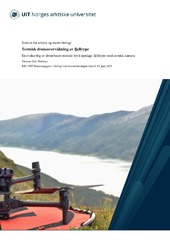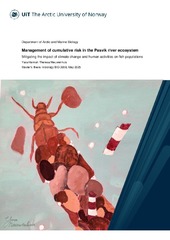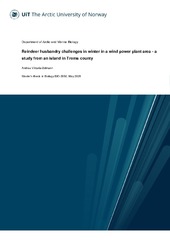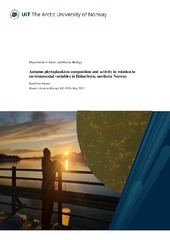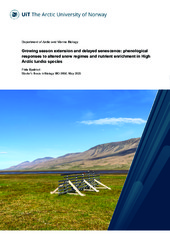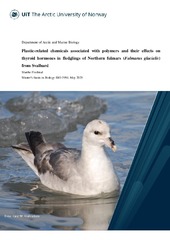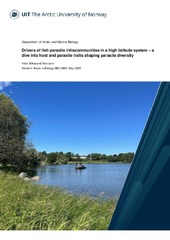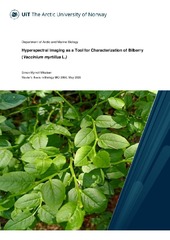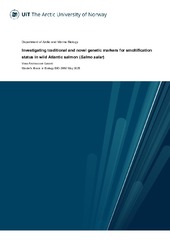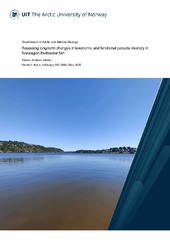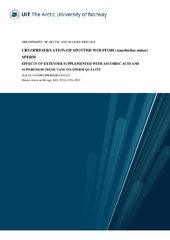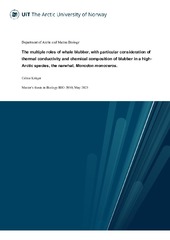Institutt for arktisk og marin biologi: Recent submissions
Now showing items 1-20 of 2086
-
Measuring cytokines in Eurasian tundra reindeer (Rangifer tarandus tarandus) with a bovine bead-based multiplex immunoassay and real-time PCR
(Journal article; Tidsskriftartikkel, 2025-06-18)Background - Reindeer (Rangifer tarandus tarandus) herding is based on access to seasonal pastures. Pastureland is, however, being lost and fragmented due to e.g. climate change, human activities, and predators, creating an increasing need for feeding and fencing. This alters disease occurrence, leading to a greater need for disease investigation tools. Knowledge of the activation of immune pathways ... -
Elucidating the knowledge, attitude, and stigma associated with tuberculosis: a community based descriptive study in Wau and Jur River, South Sudan
(Journal article; Tidsskriftartikkel; Peer reviewed, 2025-02-04)Background - Tuberculosis (TB) is a major public health problem in South Sudan. Inadequate knowledge, negative attitudes and perceived stigma may complicate the prevention efforts. This study describes knowledge, attitude, and stigma associated with TB among communities in Wau and Jur River, South Sudan.<p> <p>Methods - From March to May 2023, a cross-sectional study was conducted among 352 ... -
A Coastal Barometer to balance blue growth for northern Norway’s future
(Journal article; Tidsskriftartikkel; Peer reviewed, 2025)Growth of the blue economy will affect coastal ecosystems, altering human impacts, biodiversity, and ecosystem functions—transforming coastal societies in the process. The Coastal Barometer is intended to help find a good balance between growth, environmental conservation, and community well-being. -
Ecosystem metabolism and nitrogen budget of a glacial Fjord in the Arctic
(Journal article; Tidsskriftartikkel; Peer reviewed, 2025-07-02)Fjords in the Arctic are changing rapidly due to multiple factors including increasing air temperatures, the influx of Atlantic Water (Atlantification), sea-ice loss, retreat of tidewater glaciers, increased freshwater discharges, pollution and tourism. Understanding how these changes affect ecosystem processes and functions and, thus, services to society is critical. Net Ecosystem Metabolism (NEM) ... -
Contrasting seasonal patterns in particle aggregation and dissolved organic matter transformation in a sub-Arctic fjord
(Journal article; Tidsskriftartikkel; Peer reviewed, 2025-01-31)Particulate (POM) and dissolved (DOM) organic matter in the ocean are important components of the Earth's biogeochemical cycle. The two are in a constant state of dynamic change as a result of physical and biochemical processes; however, they are mostly treated as two distinct entities, separated operationally by a filter. We studied the seasonal transition of DOM and POM pools and their drivers in ... -
Metagenome-assembled-genomes recovered from the Arctic drift expedition MOSAiC
(Journal article; Tidsskriftartikkel; Peer reviewed, 2025-02-04)The Multidisciplinary Observatory for Study of the Arctic Climate (MOSAiC) expedition consisted of a year-long drifting survey of the Central Arctic Ocean. The ecosystems component of MOSAiC included the sampling of molecular data, with metagenomes collected from a diverse range of environments. The generation of metagenome-assembled-genomes (MAGs) from metagenomes are a starting point for genome-resolved ... -
Termisk droneovervåkning av fjellrype - En evaluering av dronebasert metode for å oppdage fjellryper med termisk kamera
(Master thesis, 2025)Sammendrag Bærekraftig forvaltning av jaktbare arter krever pålitelige overvåkningsmetoder. Fjellrype (Lagopus muta) er en populær art blant jegere i Norge, men som vi mangler effektive overvåkningsmetoder for. I denne studien ble det brukt en DJI Matrice 30T drone med RBG- og TIR-kamera for å undersøke om sensorene kan brukes til overvåkning av fjellryper. Studien har også undersøkt hvilke ... -
Management of cumulative risk in the Pasvik river ecosystem Mitigating the impact of climate change and human activities on fish populations
(Master thesis, 2025)The cumulative risk of climate change, pollution and other anthropogenic stressors challenges the sustainable management of freshwater ecosystems. Rapid warming at high latitudes is of concern due to the climate-driven amplification of risk mediated by interactions between the climate change and human activities. Here I address the cumulative risk in the subarctic Pasvik riverine system exposed to ... -
Reindeer husbandry challenges in winter in a wind power plant area - a study from an island in Troms county
(Master thesis, 2025)The establishment of the Kvitfjell/Raudfjell Wind power plant (WPP) in a reindeer herding district has raised concerns about potential impacts on herded reindeer habitat use and herding practices. The wind power plant was constructed between October 2017 and December 2020. Two years prior to construction, a herding family moved to the area with a new reindeer herd and engaged in intensive herding ... -
Autumn phytoplankton composition and activity in relation to environmental variables in Håkøybotn, northern Norway
(Master thesis, 2025)Phytoplankton are an important part of marine food webs. They are subject to environmental factors such as light, temperature, salinity, nutrient concentrations, and stratification, all of which are rapidly changing with the warming climate. In the Arctic, both abiotic environment and phytoplankton community composition show strong seasonal trends. There has been a high interest in understanding ... -
Growing season extension and delayed senescence: phenological responses to altered snow regimes and nutrient enrichment in High Arctic tundra species
(Master thesis, 2025)Arctic ecosystems are experiencing rapid changes in climate conditions, with a shift in snow regimes and nutrient availability, likely to impact plant phenology and productivity. This study investigates how increased snow depth and nutrient enrichment influence the timing of phenological phases and length of the growing season in tundra vegetation in Adventdalen, Svalbard. A factorial field experiment ... -
Plastic-related chemicals associated with polymers and their effects on thyroid hormones in fledglings of Northern fulmars (Fulmarus glacialis) from Svalbard
(Master thesis, 2025)Northern fulmars (Fulmarus glacialis) are pelagic seabirds prone to ingest plastics. Upon ingestion, plastic particles can have both physical and chemical impacts, although these effects are poorly understood. This study investigated the occurrence of plastic-related chemicals (PRCs) in relation to the type of plastic polymers ingested, as well as their potential endocrine disrupting effects on ... -
Drivers of fish parasite infracommunities in a high latitude system – a dive into host and parasite traits shaping parasite diversity
(Master thesis, 2025)Understanding the structuring drivers of host-parasite communities is central to predicting how these organisms will respond to environmental changes that are occurring at a rapid rate in northern latitude systems. Many factors shaping complex and ecologically important communities of fish-parasites in freshwater systems remain incompletely understood, particularly at the infracommunity level. Using ... -
Hyperspectral Imaging as a Tool for Characterization of Bilberry (Vaccinium myrtillus L.)
(Master thesis, 2025)Plants growing at high latitudes are subjected to environmental conditions with significantly different light and temperature regimes compared to lower latitudes, which can influence local adaptations related to the plant’s secondary metabolite profile. Several studies have demonstrated the potential of utilizing hyperspectral imaging in plant phenotyping. This thesis provides insight into how plant ... -
Drivers of coastal ecosystem structure: Using fishing mortality, primary production and temperature to predict biomass distributions of ecosystems along the Norwegian Coast
(Master thesis, 2025)Coastal ecosystems constitute productive marine areas that provide valuable ecosystem services such as harvestable fish stocks and critical habitats for spawning. With increasing impacts of human activities and climate change on coastal ecosystems, more knowledge about what shapes their structure is needed to manage them sustainably. Ecosystem modeling in Ecopath with Ecosim (EwE) has been widely ... -
Karakterfri vurdering i naturfag – økt forståelse eller økt usikkerhet?
(Master thesis, 2025)Denne masteroppgaven undersøker hvordan en karakterfri termin i naturfag påvirker elevers opplevelser og holdninger til vurdering. Hovedsakelig er oppgaven en komparativ studie mellom elever på to videregående skoler. For å samle inn data utviklet jeg et omfattende spørreskjema med spørsmål tilknyttet karakterfri vurdering. Spørreskjema gikk gjennom runder med redigering, og pilotundersøkelser med ... -
Investigating traditional and novel genetic markers for smoltification status in wild Atlantic salmon (Salmo salar)
(Master thesis, 2025)Atlantic salmon are anadromous fish, meaning they hatch and live their young lives in freshwater (FW), before migrating to seawater (SW) to feed and grow. The salmon must undergo physiological change to prepare for the new environment. This adaptation is called smoltification or parr-smolt-transformation (PST). One of the most obvious changes is the increasing salinity in SW. As the salmon migrates ... -
Assessing long-term changes in taxonomic and functional parasite diversity in Norwegian freshwater fish
(Master thesis, 2025)Climate change driven loss of biodiversity is occurring at an unprecedented rate, especially in vulnerable high-latitude freshwater systems. Despite the increasing recognition of parasites in ecosystems, there is a lack of long-term data on freshwater fish parasites, limiting our ability to understand changes in biodiversity of these important ecosystem players. This study investigates how freshwater ... -
CRYOPRESERVATION OF SPOTTED WOLFFISH (Anarhichas minor) SPERM EFFECTS OF EXTENDER SUPPLEMENTED WITH ASCORBIC ACID AND SUPEROXIDE DISMUTASE ON SPERM QUALITY
(Master thesis, 2025)The spotted wolffish (Anarhichas minor) holds considerable promise for cold-water aquaculture due to its high fillet yield, docile behaviour, and resistance to disease. However, reproductive constraints—including limited sperm motility, low ejaculate volume, and narrow spawning windows—impede large-scale hatchery production. Cryopreservation offers a strategic solution for overcoming these limitations ... -
The multiple roles of whale blubber, with particular consideration of thermal conductivity and chemical composition of blubber in a high-Arctic species, the narwhal, Monodon monoceros.
(Master thesis, 2025)Blubber in marine mammals is a multifunctional tissue, serving critical roles in thermoregulation, energy storage, endocrine regulation, and hydrodynamics. By providing insulation against cold, acting as a dense energy reserve, secreting hormones such as leptin to regulate metabolism, and streamlining the body for efficient swimming, blubber supports survival in diverse and often extreme environments. ...


 English
English norsk
norsk





